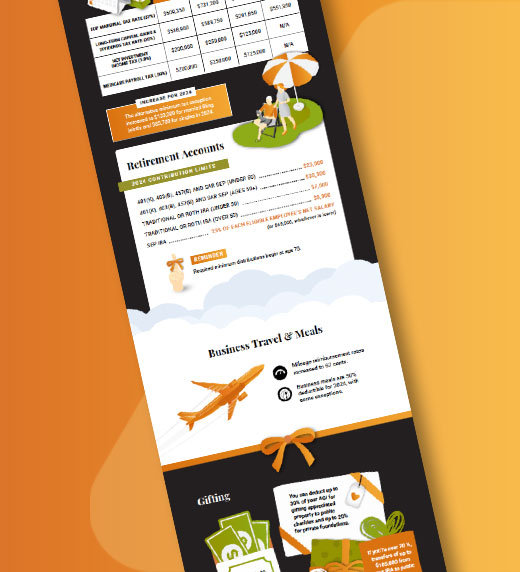
Updated August 12, 2022
Are you planning to move your business or your home to another state? Or do you spend a significant amount of time living temporarily in another state? If so, you should be aware of how these choices could impact your taxes. Below we cover the tax implications of moving your business to a new state, moving your primary residence to a new state, or spending time living temporarily out of state.
Moving a business to a new state is a complex decision. Among the many factors to consider is the state and local tax (SALT) implications on the business, employees and owners.
An important SALT concept is “nexus,” which occurs when a business has a presence in a state. Once nexus is created with a state, the business will likely need to register ‘to do business’ in that state. While this will avail the business the rights to the courts and other services in the state, it may subject the business or its employees to various state tax return filing requirements. Each state has different nexus standards, and within a state, there may be different standards for different types of tax (i.e., sales taxes vs. income taxes).
We suggest you start this process by asking a simple question: In what states do I have a physical presence? Some considerations are:
Having nexus in multiple states could create a planning opportunity to shift income to states with lower tax rates. In fact, where to locate a warehouse or headquarters often starts with understanding the SALT landscape.
Once you know the states in which you have nexus, analyze the tax impact of moving from one state to another. Part of that analysis is understanding the different taxes that could apply based on your entity type. The major taxes to considered are:
Depending on the states involved, there are other factors that could significantly affect the tax implications. Two examples are:
If your business is set up as a flow-through entity (partnership, S-corporation, or LLC), know the individual income taxes in the new state, as the taxes to be paid on the business income most likely will be taxed on the owner’s individual income tax return. The tax impact could also change significantly if you are changing your personal state residency in addition to moving the business to a new state.
If you wish to change your state residency, take the proper steps to establish your domicile in the new state.
You should discuss the legal implications of moving to a new state with your attorney. Depending on your legal structure, you may need to dissolve your current entity in the old state, create a new entity in the new state, merge or convert into a new entity, and/or become a qualified foreign entity in the new state. Understanding the various options and choosing the most beneficial one prior to moving will be critical. If you wait to figure it out after you have already moved, you may not have as much flexibility with the options.
Some other items to consider are:
As with any major business decision, the tax implications of moving to a new state should not be the only factors considered. The move must make sense in all aspects, but the tax implications could play a significant role in the overall financial analysis.
If you are considering a residency change, understanding the laws of the state you are moving from and the one you are moving to is critical to ensuring state income tax liability in your former state doesn’t continue. This applies not only to income tax exposure, but also to estate and inheritance taxes in states that impose them.
States use various methods to locate potential non-filers for residency audits, and many are becoming more aggressive and sophisticated at recouping lost tax revenue from individuals that have failed to pay income, estate and inheritance taxes in locations where they are still defined as residents. Some examples are checking systems for real property records for bills sent out of the state and comparing those with income tax returns filed, 1099s/1098s being filed by the payer with the state rather than the taxpayer’s domicile state, and receiving a non-resident return when a resident return was filed for the preceding tax years.
Only seven states (Alaska, Florida, Nevada, South Dakota, Texas, Washington and Wyoming) don’t impose an individual income tax on residents. The tax you owe depends on your classification as a full-time resident, part-year resident or non-resident. States have different rules for determining your residency status for taxation purposes, which are more complex than can be fully addressed in this article. Domicile and statutory residency are two factors most states use in determining residency status.
Your domicile (or legal residence) is your fixed, permanent and principal home where you reside and intend to return to after times of absence. You can only have one at a time. Establishing domicile in a new state is more complicated than changing your address on your tax return and driver’s license. Some states can consider you a resident for tax purposes even though your domicile is elsewhere. If you can prove domicile in another state, say Texas, the next step is being able to prove you aren’t a statutory resident in another state.
Statutory residency is generally, but not always, established by spending more than 183 days in a state and having access to an abode (somewhere you have a key and keep your things – you don’t have to own it). This trumps domicile in almost every state and can result in owing taxes on 100% of your income in some states, even if you owe taxes to another state for the same income.
For example, in California, the number of days spent outside of the state may not be enough to exempt you from income, estate or inheritance taxes there. You are considered a resident if you are either present in California for “other than a transitory or temporary” purpose or domiciled in California, but outside California for a transitory or temporary purpose. Residency is primarily a question of fact determined by examining your particular circumstances. The burden of proof is ultimately on you.
Also, the term residency may have more than one definition within a state. For example, in Texas, there are residency rules for higher education while qualification for homesteading a residence has a different definition.
Some examples are voter and vehicle registration, driver’s license, receiving mail, opening accounts, changing to local professionals for services, permanent mail forwarding and sending children to school in the new state, as well as severing ties with the old.
How many moving companies move you into your new home on New Year’s Day? Although it might seem simple, this is a red flag for a residency audit in many states.
You must leave the old state and actually land in the new state. Was there intention to come back to the original state? Where are you when the state tax audit is happening a few years after the move?
For many states, one minute in the state counts as a day. Spending the night (crossing midnight) equates to two days. Generally, there are a few exceptions, including military service, travel and medical procedures.
The duration of your stay in a particular state doesn’t automatically establish your residency. States also look at where you spent the 183 days and what you were doing while there. Having support for the number of days is important, but this is not in and of itself determinative.
Auditors in some states have gone as far as reviewing credit card swipes, toll records, cell phone records, personal and business calendars, interviewing doormen, and verifying doctor and salon appointments.
Your state of domicile might not be the only state in which you are taxed. Although in some states there are credits available for taxes paid on certain income in another state, this isn’t always the case. And if not properly understood, you could end up paying taxes on the same income in multiple states.
Is my true intent to move and not return? If so, do I have a solid understanding of what I need to do in both states to ensure I can support my intention with documents and records to establish a new domicile and end domicile in the prior state?
By taking the time to understand your move’s possible tax implications, in both the state you are moving to and the one you are leaving, you’ll be able to minimize any surprise state taxes. If you have questions about the tax implications of a residency change or need help with tax planning to mitigate unforeseen taxes, contact our experts.

